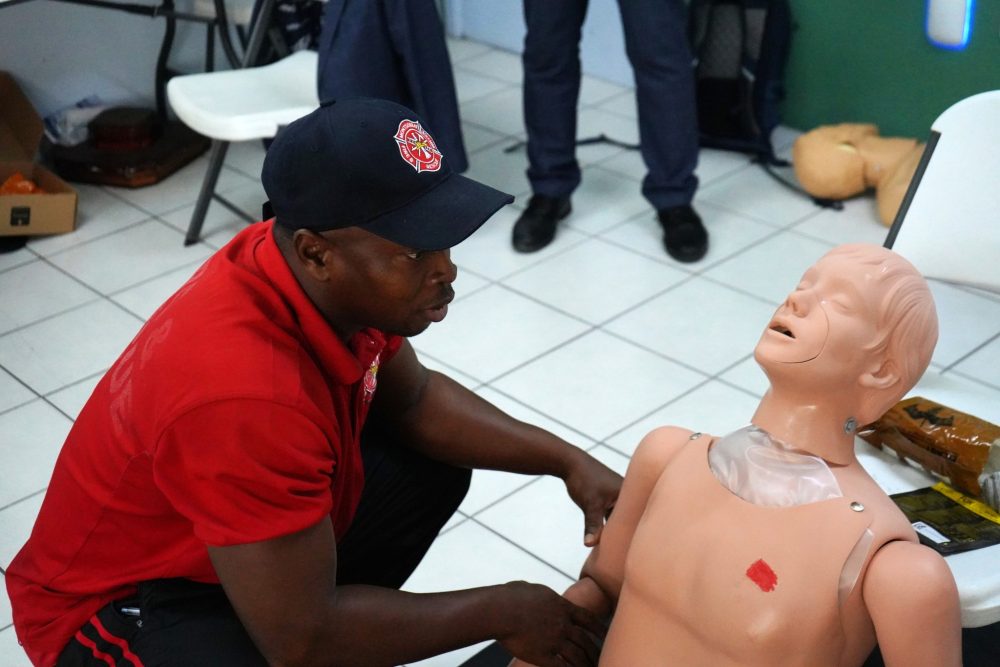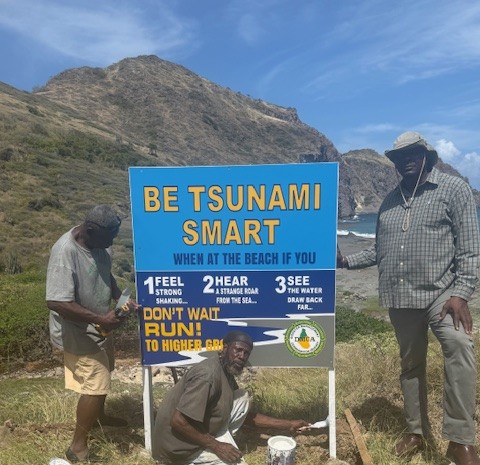BRADES – Montserrat’s Police and Social Services are two of the agencies which a recent review sees as willing but unable to adequately protect Montserrat’s children.
The Executive Summary of the Child Safety Review conducted by Michael Sheath and Adrian Todd of The Lucy Faithfull Foundation of the United Kingdom was released by the office of the Governor on Wednesday, March 4, 2015.
Sheath and Todd interviewed a total of 63 people in December of 2014 on the matter of child protection. In the three-page summary the duo highlighted several issues of concern and made recommendations to manage the problems.
According to the report “Children on Montserrat were considered to be particularly vulnerable as a result of the number of single parent and disrupted families, the separation of children from their parents as a result of economic migration, and the breakdown of traditional village structures, where a form of collective and concerned parenting had been replaced by a degree of indifference and a form of bystander effect, where individuals assume that someone else will take action, resulting in a collective failure to act at all.
“The Reviewers received consistent suggestions that there were elements in Montserrat society who were responsible for the sexual abuse and exploitation of girls, and that those individuals managed to subvert the role of the authorities by making payments to the families of their victims in order to forestall a criminal complaint. The Reviewers felt that a strategy for addressing this matter could be formulated and implemented on island, and that there was sufficient will and capacity in the safeguarding institutions and the wider government to achieve it.
 “The Reviewers considered that the social services department and the members of the Royal Montserrat Police Force who had the most active dealings with safeguarding were dedicated and competent, but were handicapped by an absence of legal, institutional and operational powers. The island currently lacks coherent legislation that might underpin efforts to safeguard children, and the social services department are forced to use outdated and clumsy statutes as a means of legitimising their role. The police have no means of securing children’s testimony or of protecting them when they are giving evidence, two features which facilitate the alleged use of ‘pay offs’ which are widely believed to have frustrated criminal prosecutions. It was felt that efforts to improve the training, legislation and tools available to these front line services would quickly bear fruit. The recent changes in the law which have increased the penalties for sexual offending are commendable and offer a clear societal message, but incarceration without treatment or monitoring afterwards is not a solution in itself.”
“The Reviewers considered that the social services department and the members of the Royal Montserrat Police Force who had the most active dealings with safeguarding were dedicated and competent, but were handicapped by an absence of legal, institutional and operational powers. The island currently lacks coherent legislation that might underpin efforts to safeguard children, and the social services department are forced to use outdated and clumsy statutes as a means of legitimising their role. The police have no means of securing children’s testimony or of protecting them when they are giving evidence, two features which facilitate the alleged use of ‘pay offs’ which are widely believed to have frustrated criminal prosecutions. It was felt that efforts to improve the training, legislation and tools available to these front line services would quickly bear fruit. The recent changes in the law which have increased the penalties for sexual offending are commendable and offer a clear societal message, but incarceration without treatment or monitoring afterwards is not a solution in itself.”
The report stated that “Multi Agency working and cooperation on Montserrat is in its infancy, and needs to be more coherent. There are competent and committed workers in all of the departments: social services, the police, health and education, but they clearly struggle to collaborate in terms of identifying children at risk and in approaching those concerns in concert. We have made various suggestions as to how levels of cooperation might be improved.”
Some of the recommendations from the team include the “development of a suite where vulnerable witnesses, including children, might be interviewed, and their testimony secured. This will involve some expenditure on equipment, and training in its use. Known as an ‘ABE Suite’, this facility will offer a child friendly atmosphere, away from the police station, where children can engage with specially trained police officers and social workers, and have their account video recorded and secured. This can be used as evidence in chief in any criminal proceedings.
The consultants made recommendations in relation to:
- Securing forensic evidence from victims, and from computers and mobile telephones
- Training for police officers in conducting investigations into sexual crimes
- Swift passage into law of the Children (Care and Protection) Act 2012 to provide a framework for the more effective operation of child protection measures, and legitimise and shape any interventions in families which are deemed necessary to secure the welfare of children
- Training and supervision of social services workers to improve service delivery
- Securing the retention of effective workers
- Training a cohort of foster carers
- Improving the treatment and monitoring of identified sexual offenders, including legislation which allows the police to intervene if they feel a known offender is likely to reoffend.
- Establishing a Children’s Safeguarding Board to coordinate, shape, and lead efforts to protect children from neglect and abuse.
- Adopting the document ‘Working Together 2013’, which lays down a benchmark for inter agency cooperation in England and Wales, and promotes the notion that safeguarding children is the responsibility of the whole society rather than resting with the professional agencies.
- Launching a public education campaign through print media, radio and posters, to raise the subject of children’s safety and child exploitation.
“Similar campaigns have been undertaken in the UK and in other territories, specifically the Falkland Islands, to some good effect. The notion of prevention being worth more than any cure will be central to this strategy, and we expect to engage with the Christian Council and the Montserrat Children’s Society as allies in this campaign, which builds upon the cross Caribbean UNICEF ‘Break the Silence’ initiative,” ends the report.
The full review is to be shared with the stakeholders for comments and adoption.
Discover more from Discover Montserrat
Subscribe to get the latest posts sent to your email.



